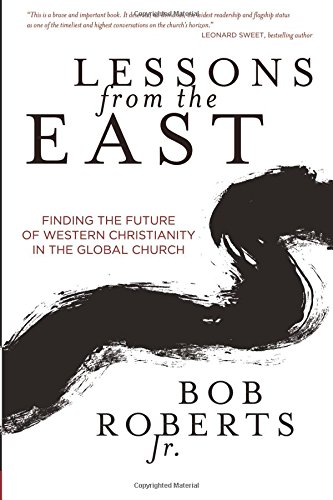Of late, I’ve read several good books. Fortunately, they are only in competition with each other for time rather than content. Otherwise, it would seem disingenuous that I am a fan of all of them. It’s been a better run for books these past few months. As is usual, I’ve been sent a copy of the book in exchange for the review.
competition with each other for time rather than content. Otherwise, it would seem disingenuous that I am a fan of all of them. It’s been a better run for books these past few months. As is usual, I’ve been sent a copy of the book in exchange for the review.
Lessons from the East, by Bob Roberts, Jr., and from David C Cook Publishers, is a packed paperback pushing perspectives previously pondered….okay, that’s all I can alliterate. The key thought is found on the back cover of the book: “What if our western view of church isn’t God’s view of church?”
That is the question which drives Pastor Roberts’ writing. At first blush, this looks like another “everything we’re doing is wrong” book, like many have already written. That’s a tired genre.
Note: for simplicity’s sake, I’ll be using “Western Church” for the overall mix of culture and Christianity we find in Western Europe and the USA as well as those places heavily influenced by our ways. There are “Western Church” habits on nearly every continent because of missiological methods. “Eastern Church” would refer, generically, to the mix of culture and Christianity that has developed differently and connects to the different cultural emphases found in more of the Asian/African world. These terms are gross oversimplifications, but necessary unless you want this to be a dissertation.
Roberts’ approach is different. First, he acknowledges the pre-existing good in the Western Church. This feature is encouraging for those of us who serve in normalized western churches: we’re not all bad. We do need, though, to stop living like we are the inventors of church or the perfectors thereof. That is reserved to God who works through His Spirit in all of His people.
Roberts’ continues by explaining how he is involved in churches beyond the Dallas-Fort Worth area of Texas. He walks the reader through how people, who still take the Bible seriously, have seen “church” develop in the Eastern World and what that means for its impact there.
He then goes back to connect what lessons we need to learn from these churches. His arguments are sound, though a few places I find questionable in his use of the text. Some of this is my conservative, slow-to-change tendency. Some is simply discussions that can go both ways.
In all, though, Roberts presents several cogent arguments about the need for Christian believers to be more hospitable to others, to be more engaged in listening to others is worthwhile. He encourages dialogue with other faiths, but firm dialogue that focuses on the truth.
I can recommend this as a church leadership read, especially with the included discussion guide.
(Below is a brief video from the author.)


No comments:
Post a Comment
To deal with SPAM comments, all comments are moderated. I'm typically willing to post contrary views...but I also only check the list once a day, so if you posted within the last 24 hours, I may not be to it yet.